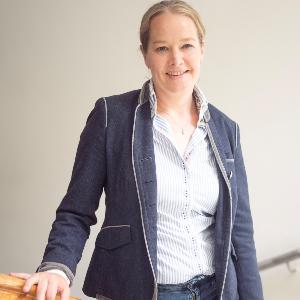Research for animal welfare
23 Jun 2025
With innovative research and modern technology, veterinary scientist Helen Louton is seeking to improve the living conditions of livestock.
23 Jun 2025
With innovative research and modern technology, veterinary scientist Helen Louton is seeking to improve the living conditions of livestock.

Prof. Dr. Helen Louton | © LMU/LC Productions
Cruelty to animals in a poultry abattoir in Wassertrüdingen, mistreatment of dairy cows on a farm in the Allgäu: Serious breaches of animal welfare in the husbandry and slaughtering of livestock rightly cause outrage in the media and among the general public. Nevertheless, Professor Helen Louton sees Germany as on the right road here: “Awareness of animal welfare has increased as a result of a generational shift in agriculture and animal husbandry,” she says. “And this development is expected to remain positive in the future.” She notes that farms have invested a lot in technologies that are gentle on animals, while managers have placed an increasing emphasis on various aspects of animal welfare. As such, she regrets that examples like the most recent incidents often bring the entire sector into disrepute.
Since last November, Louton has been Chair Professor of Animal Welfare, Ethology, Animal Hygiene, and Animal Husbandry at LMU’s Faculty of Veterinary Medicine. Although she is specialized in poultry, her team at the chair covers research and teaching in relation to all aspects of livestock husbandry, researching solutions that can further improve animal welfare.
Louton’s work focuses on animal welfare in the transportation and slaughtering of livestock, the improvement of living conditions, management aspects, and the relationship between humans and animals. An example of the latter is a current study called GentleChick, in which researchers led by Helen Louton are investigating what effects early interaction between livestock and humans have in the case of poultry. “We were able to demonstrate, for example, that a positively intentioned contact or ‘gentling’ of chicks at a very early stage of life has a positive effect on the subsequent behavior of the chickens,” explains Louton. These chickens responded without fear, and thus largely without stress, to their human carers.
Awareness of animal welfare has increased as a result of a generational shift in agriculture and animal husbandry.Prof. Dr. Helen Louton
In another research project, which is being undertaken in cooperation with the University of Rostock – where Helen Louton worked before coming to LMU – and further partners, Louton studies the hatching of chicks in the coop. “Breeding coops generally obtain their chicks from hatcheries,” explains the veterinary specialist. These chicks are transported by truck, causing them stress. To avoid this, the eggs can be hatched directly in the fattening farms. As well as removing the need for transportation, this also gives the chicks immediate access to food and water.
However, this form of breeding also has its disadvantages, as it gives the operators of poultry farms less time for a full cleaning of coops, which can negatively impact hygiene standards. Moreover, unhatched chicks have to be killed and their bodies disposed of in the proper manner, which requires additional expert knowledge and equipment. The researchers have set themselves the task of weighing up the pros and cons and developing possible solutions.
The students have to recognize when they need to intervene as future veterinarians.Prof. Dr. Helen Louton
Louton and her team employ state-of-the-art technologies in their work – such as their investigations into the behavior of chickens in the coop. They fit out the animals with modern RFID tags, a technology that uses radio waves for communication. In this way, the scientists can track where the chickens are in the coop at various times, which allows them to draw inferences about the birds’ behavior. These technological possibilities enable the researchers, say, to investigate the effects of health limitations on the behavior of the animals and resource usage, and to identify potential suffering. To this end, the team uses a mobile coop, which Louton brought with her from the University of Rostock and which is now kept on the grounds of the Faculty of Veterinary Medicine.
Helen Louton studied veterinary medicine at the Free University of Berlin. She completed her doctorate at LMU and also did her habilitation thesis here on the subject of Recording, applying, and assessing evaluation criteria (animal welfare indicators) during the breeding, raising, transportation, and slaughter of gallinaceous birds. This dissertation earned her a habilitation award from the Munich University Society (MUG) in 2021.
The close interconnection of study and practice is important to Helen Louton not just in her research, but also in her teaching. “We organize regular excursions to livestock farms and abattoirs so that students can put what they’ve learned into practice,” she says. And if some students are not so keen on the abattoir internship, it is important for them to experience where problems exist and what can go wrong during the slaughtering process. “The students have to recognize when they need to intervene as future veterinarians.”
Louton’s teaching skills were acknowledged at the Women in Ag Awards, where she got 3rd place in the Education category. The prize is awarded by the German Agricultural Society (DLG) in conjunction with the Women in Ag Magazine.